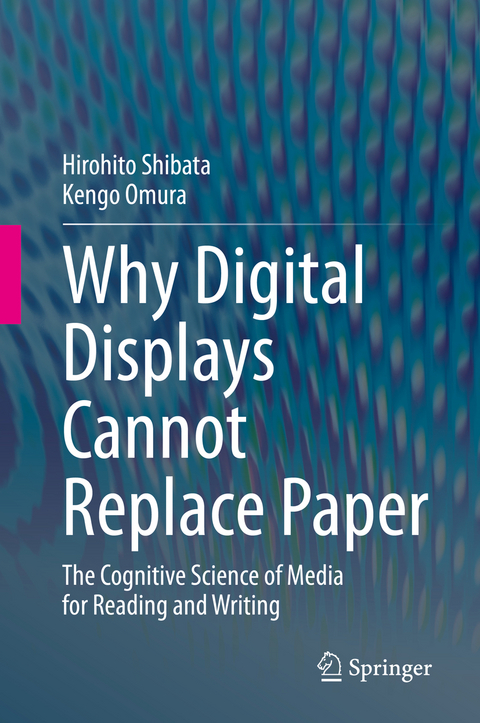
Why Digital Displays Cannot Replace Paper
Springer Verlag, Singapore
978-981-15-9475-5 (ISBN)
Hirohito Shibata is a professor at the Faculty of Social Information, Gunma University. He received a Master of Science degree from Osaka University in 1994 and a Doctor of Engineering degree from The University of Tokyo in 2003. He worked for Fuji Xerox Co., Ltd. as a researcher from 1994 to 2000 and then since 2003 to 2020. He was also a part-time lecturer at the Tokyo University of Technology and at Otsuma Women’s University and was a board member of the Japanese Society for Artificial Intelligence (SJAI). He is a Fellow of the Imaging Society of Japan (ISJ) and is also a vice president of the Electronic Paper Consortium, Japanese Business Machine and Information Systems Industries Association (JBMIA). His specialties are user interface design and cognitive science. He is also interested in supporting human intellectual activities using computers. The research on media introduced in this book has been conducted since 2007. At present, he is working on research to design a newdigital medium for reading and writing.Kengo Omura graduated from the doctoral program of the Department of Psychology, Graduate School of Sociology, Keio University. After joining Fuji Xerox Co., Ltd., he worked on studies of cognitive science, document design, and the development of document creation support. He is also a part-time lecturer at Kamakura Women’s University. His specialty is cognitive psychology. Books he has written include Cognitive Psychology Course 2: Memory and Attention (University of Tokyo Press, 1985) and Cognitive Psychology Important Study 2: Memory Cognition (Seishin Shobo, 1996).
Chapter 1: Reading and Writing in the Digital Age.- Chapter 2: Various Media and their Characteristics.- Chapter 3: The Ease of Reading from Paper and the Difficulty of Reading from Displays.- Chapter 4: Effects of Presentation Quality in Reading.- Chapter 5: Effects of Operability on Reading.- Chapter 6: Ease of Concentration on Reading.- Chapter 7: The Effects of Writing and Drawing by Hand.- Chapter 8: Discussion and Proposals.- Chapter 9: Conclusion.
| Erscheinungsdatum | 13.11.2020 |
|---|---|
| Zusatzinfo | 58 Illustrations, color; 10 Illustrations, black and white; XIX, 181 p. 68 illus., 58 illus. in color. |
| Verlagsort | Singapore |
| Sprache | englisch |
| Maße | 155 x 235 mm |
| Themenwelt | Geisteswissenschaften ► Psychologie ► Allgemeine Psychologie |
| Geisteswissenschaften ► Psychologie ► Verhaltenstherapie | |
| Mathematik / Informatik ► Informatik ► Betriebssysteme / Server | |
| Informatik ► Software Entwicklung ► User Interfaces (HCI) | |
| Technik ► Elektrotechnik / Energietechnik | |
| ISBN-10 | 981-15-9475-9 / 9811594759 |
| ISBN-13 | 978-981-15-9475-5 / 9789811594755 |
| Zustand | Neuware |
| Informationen gemäß Produktsicherheitsverordnung (GPSR) | |
| Haben Sie eine Frage zum Produkt? |
aus dem Bereich


